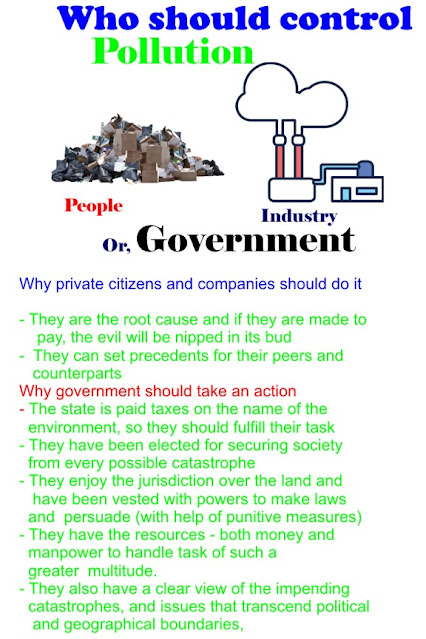Some people argue that companies and private individuals, rather than governments, should pay to clean up the pollution that they produced. To what extent do you agree or disagree?
Why
private citizens and companies should do it
- They
are the root cause and if they are made to pay, the evil will be nipped in
its bud
- They can set precedents for their
peers and counterparts
Why
government should take an action
- The
state is paid taxes on the name of the environment, so they should fulfill
their task
- They
have been elected for securing society from every possible catastrophe
- They
enjoy the jurisdiction over the land and have been vested with
powers to make laws and create a framework to persuade (with help of
punitive measures) or coax (encouragement) people into following
eco-friendly policies.
- They
have the resources - both money and manpower to handle task of such a
greater multitude.
- They
also have a clear view of the impending catastrophes, and issues that
transcend political and geographical boundaries, due to being in
possession of expert resources.
There is a great tug of war going on between disparate sections of society as to whether businesses and people should be made to bear the cost of cleaning up the environment, or not. While some accord to the proposal of laying the onus on the former, others out rightly dissent.
Those rallying behind the suggestion of making citizens and commercial organizations responsible for undoing the damage to the ecology, feel that it is them, the source of the trouble, where the individuals mindlessly engage in practices that are hostile to the the planet such as overuse of cars - that emit fumes, wastage of water, food and other resources - that is leading to catastrophic outcomes, business organizations are recklessly exploiting resources, resorting to deforestation and dumping industrial waste in all the three spheres of the environment. Therefore, charging them for the restoration of the ecology will teach an invaluable lesson and dissuade them from following practices that are hostile to nature.
Overall, despite this move looking unfair in its intent, I feel that people and business establishments must contribute to plans made for preserving the ecology even though the state must also play a part in this endeavor instead of avoiding this area.

